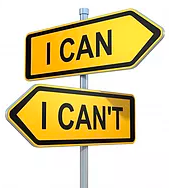
As humans we have access to a wide variety of words that we draw upon to explain and provide meaning in a range of situations. Some of these words we choose carefully, in order to portray a particular ideal. Some words we may pull out to use because it is how we feel, and other times it may be learnt sayings and phrases that we use to explain ourselves and our thoughts. Words are interesting things. We can use one word in a positive way, to lift us up and provide hope…. but, we can also use them to hurt ourselves, or create a barrier that is incredibly difficult to pull down.
CAN and CAN’T are two of these words.
I once had a dance teacher (a long time ago now) who always insisted that everyone in the studio could do any dance sequence, no matter how hard it was, if you broke it down, learnt the steps in order, and then worked on putting it together. Sometimes, this took an hour to do. Sometimes it would take a day and other times it might have taken two weeks to master……but, in the end, we could all do it! I vividly remember a young girl practically crying that she “CAN’T” do it. The dance teacher looked into her eyes. She told her “you CAN do it, I believe in you, and I know you CAN do it. It might take a bit of practice, but you CAN. I never, ever want to hear you say CAN’T again.” And you know what? She never did!
In a way, what the young girl perceived was too hard, and her reaction that she couldn’t do the dance sequence, meant that she had already given up before she even began. Over the next few weeks she demonstrated that she could do it. She worked at it little bit, by little bit, and over time, she got it perfectly.
What on earth does this have to do with tutoring?
During my time in the classroom, and even in my time tutoring, I have seen so many children tell me they “CAN’T”. No matter how much I have tried to persuade them otherwise, and tried to break the steps down, they still say “I CAN’T”. By using the word “can’t” they had immediately put up a barrier, which has been extremely difficult to remove. Some of my students have said they “can’t” before they have even seen the steps used to build the idea or product, they have said it simply because it looked too hard.
Sometimes I wonder if we have taught them this as a society as well. If something looks too hard, instinctively, we may give up, not even trying it to begin with. In reality, we should be breaking down the barriers we have built up to attempt things.
Sometimes I feel like the child has said “CAN’T” so many times, that they actually believe they will NEVER be able to do it. If we have built our children to feel good with praise, and the child has only received negative (crosses, red marks, no awards or recognition of effort) feedback throughout schooling, then it is no wonder the child truly believes they can’t achieve something. If a student has received every English or Math test back, and have just seen 10% as an overall mark; or have been teased by their peers because they got a poor mark, it is no wonder that they fall into the pattern of “can’t” and build the subsequent barriers.
The most disappointing thing about CAN’T is when you hear a child tell you they CAN’T read beyond a particular level at school because the teacher told them so. I understand why it is important for us to build our readers and work the children up in reading levels. But what if the content is completely disengaging for the child. What if you are then discouraging them to read? I have a student that has tried to tell me this for four weeks now. I pull a book from my bag to do reading with them and the response is “if that is higher than level XX then I can’t read it because my teacher told me so.” This student is already significantly behind and it wasn’t picked up early. They have already disengaged with reading because it is all boring. This student has picked up CAN’T and was not even going to attempt to read for this reason.
It’s been a tough egg to crack! But I’ve finally enticed them into reading a variety of different texts by showing the student that the majority of words on the page, they already know. The student has picked up a variety of books they wouldn’t even try to read before as well, and in turn their reading, decoding and comprehension skills have begun to increase.
My point is, we need to encourage our young people that they CAN do anything they put their minds too. Every small victory should be celebrated, because everything is a success. If a child gets 6/60 in one test and 21/60 in the next test, this should be celebrated. If a student performs well in one section of the test, but not well in another, they should be reminded that they did fantastic in the first section, and the other bits are things to work towards.
By breaking our learning into steps to “work on” rather than expecting that our learners will just understand what we are showing them, this will assist children to work on the “CAN” and get rid of the “CAN’T”.
Help me celebrate all of our children’s victories, no matter how small. A small victory for one child is a massive victory for another. And a victory, is exactly that, a victory!
